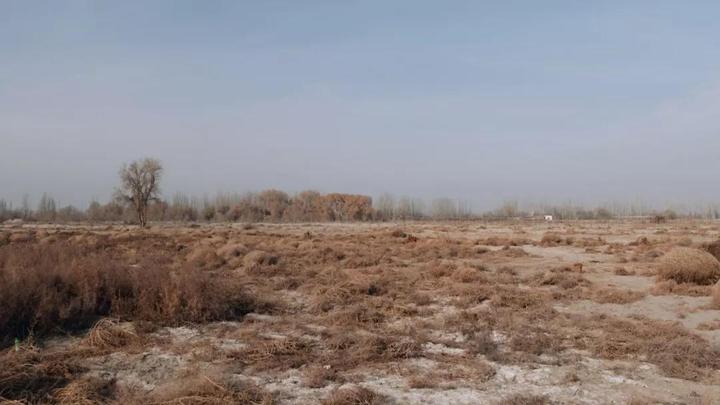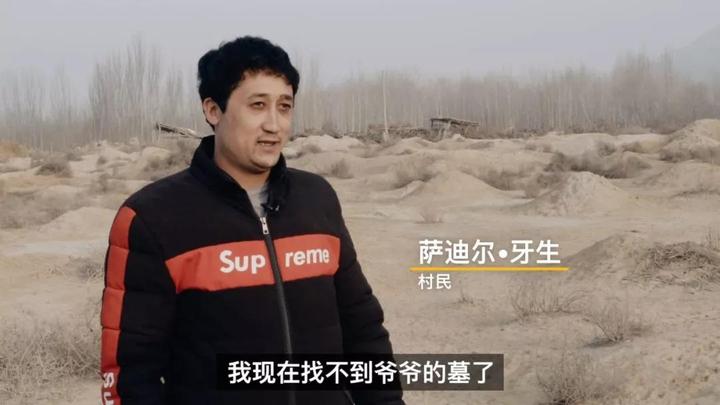近日,CNN称中国当局拆除新疆地区100多座维吾尔族的墓地。CNN以现居伦敦的维吾尔族诗人艾孜·艾沙无法找到父亲墓地为例,声称百座维吾尔族坟墓被当地政府摧毁并强调这是中国政府试图根除维吾尔族裔文化认同的一种手段。
而事实果真如此吗?CGTN记者追本溯源,找到了艾孜在新疆阿克苏地区沙雅县的家。艾孜的家在沙雅县英其曼村,距离阿克苏市区将近4个小时车程。在他家里,CGTN记者们见到了他的母亲艾皮扎木•尼扎木丁和妹妹吾尔兰木•艾沙。她们带CGTN记者们去到艾孜父亲艾沙•阿卜杜拉的墓地。

The city of Aksu in northwest China's Xinjiang Uygur Autonomous Region has undergone tremendous changes these past decades. Once a barren region lying on the edge of the country's largest desert – the Taklamakan, Aksu and its outlying areas have seen rapid urban development and greening. This pace of change, however, is often brought up in certain Western narratives as grating against age-old customs, one that touches on an intensely personal and religious subject for locals – cemeteries.
A cemetery in Xayar County of Aksu Prefecture has recently become the focus of international controversy. CNN reported that graveyards in the region were being demolished by authorities, highlighting stories such as that of Aziz Isa Elkun, a Uygur poet now residing in London, who had said he couldn't find his father's grave on Google Maps. The article implies that the "destruction" of these Uygur cemeteries, a central part of local communities, was part of a systematic effort to erase Uygur culture.
So a crew from CGTN decided to find out if there was any truth to that implication. A roughly four-hour drive from Aksu's city center lies the village of Yegiqiman, a place of charming antiquity, where CGTN found Elkun's family.

The new eco-friendly cemetery where Aziz's father is buried in Xayar County, northwest China's Xinjiang Uygur Autonomous Region, January 8, 2020. /CGTN Photo
上 图 是艾孜爸爸的 坟 墓。此 时 78 岁的艾皮扎木颤颤巍巍走到老伴的坟前,她告诉 CGTN 记者,老伴艾沙 2017年11月因心 脏 病去世。

Screenshot of CNN Website
CNN报道称,艾孜非常清楚他父亲墓地的位置,而且他不受中国政府欢迎,更不能给他母亲打电话。然而,他的妈妈给我们讲了一个完全相反的故事。
“艾孜2017年2月回来过一次,当时他爸爸病重,他回来照顾了10几天就走了。他爸爸在2017年11月4日去世。”
“2017年12月他还打电话回来,主要是问问家里的情况,叮嘱我注意身体,照顾好自己。我们过得都还不错。”

The courtyard of Aziz's home in Xayar County, northwest China's XinjiangUygurAutonomous Region, January 8, 2020. /CGTN Photo
与此同时,CNN称艾孜的父亲埋在土坟里。但CGTN记者发现CNN照片里的位置其实是沙雅县的塔里木和西米浪河附近古墓群景点,是自治区级文物保护单位。
生活在新疆农村的维吾尔族穆斯林民众习惯将逝去的亲人埋葬在土坟堆里,艾孜的爸爸也不例外。
"I haven't seen Aziz since early 2017. He came back in February 2017 to take care of his father who was seriously ill back then, and that was the last time we met," said Hepizem Nizamidin, Aziz's mother. The 78-year-old Uygur woman tottered to her husband's grave, which lies next to those of his parents and brother.
The No. 47 grave sits in a cemetery that houses thousands of graves. On December 15, 2018, Hepizem moved the remains of her husband Eysa Abdula here from a site less than 100 meters away – once an old, dilapidated land filled with unmarked grave mounds.

The old graveyard where Aziz's father had been buried in Xayar County, northwest China's Xinjiang Uygur Autonomous Region, January 8, 2020. /CGTN Photo
上图是艾孜的爸爸过去埋葬的地方。
“这些老坟堆是用土堆起来的,每次刮风下雨都会受到不同程度的破坏,甚至野猫野狗在那里打洞,当地村民们得经常修坟。”
艾皮扎木说, “我丈夫现在可以在一个有鲜花环绕的安静的地方休息,当我想念老伴的时候再也不会迷失方向。”

Aziz's mother Hepizem Nizamidin and sister Hvrlem Eysa visit his father's grave in Xayar County, northwest China's Xinjiang Uygur Autonomous Region, January 8, 2020. /CGTN Photo
The old grave site – dusty and unkempt – had been battered by the scathing sun, seasonal floods, and dry, dusty winters for decades. After Eysa died from a heart attack in November 2017, his family laid him to rest in this burial ground according to Uygur Muslim funerary rites.
"Aziz did not return for his father's funeral, so he had no idea about the burial site," Hepizem told CGTN. Aziz only called back in December 2017 – the last time they heard his voice.
Hepizem and her family had been afraid that one day they could not find Eysa's grave amid deluges of rain and dust. "We had to walk through the muddy, meandering lanes to get to the grave, always worried that we could miss it as the whole site was unattended," said Aziz's younger sister Hvrlem Eysa.
Their concern was alleviated the following April when they heard the news that a standard, concrete cemetery would be built near these old grave mounds. They applied for relocation back then and moved Eysa's grave to the new cemetery in December 2018.
"I feel assured that my husband can now rest in a peaceful, tranquil place with flowers around," said Hepizem. "I will never miss him whenever I miss him."
Hepizem is not alone in Xinjiang's grave "disappearance" myth perpetrated by CNN and other Western media outlets.
Some villagers are not even able to find the graves of their departed families, just like Sadir Yasin, whom CGTN had talked to days ago in Aksu's Uqturpan County.
"Now, we can't find my grandfather's grave as the branch erected on it is nowhere to be found," Sadir said. The grave mound of his grandpa could no longer be identified years ago due to massive flooding and whipping dry winds.
其他村民也面临着同样的问题,其中不少人甚至找不到逝去的家人的墓了,就像CGTN记者前些天在乌什县采访的萨迪尔•牙生,他爷爷的墓因为常年的风雨侵蚀、尘土飞扬,混杂在一片老墓地中,无法辨认。

从2000年代开始,当地民政局连续收到村民们的抱怨。地方政府花了十余年时间征求公众意见,建立新的生态墓地。
在下图卫星地图上可以看到,这片老坟墓附近在2018年底变成了新的生态墓地。2018年底,艾皮扎木将他老伴的墓迁到了这片新墓地,仅距离老墓地不到100米的位置。

Satellite image from 2019

Satellite image from 2014
然而,CNN在这篇文章里将迁坟称为“根除维吾尔人的族裔文化认同”。
艾孜的妈妈告诉CGTN记者,“我们是自愿迁坟的,新墓地用的都是烧砖,非常好,也不受刮风下雨等天气影响。周围都是花草树木,夏天非常漂亮。我们安心又满意。”
Since the early 2000s, local civil affairs bureaus have received complaints from residents about the decrepit environment regarding the old graveyards and the difficulty in finding the graves of their deceased relatives. Local governments spent over a decade seeking public opinions and building new environmentally-friendly cemeteries.
There are now 821 eco-friendly cemeteries in Aksu Prefecture, the majority of which were built near their corresponding old graveyards, and can satisfy demand for the next 20 years. The old graveyards, estimated at 2,787, were either turned into farmland to help generate more income for poor households or maintained as empty land for those who can't locate their families' graves for visits.
"Next we are making these graves greener, creating a better environment for people to come to talk to their beloved ones," said Halmurat Ismail, head of the civil affairs bureau at Aksu's Uqturpan County.